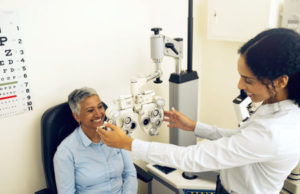Glaucoma is a sneaky eye disease that, if not detected and treated in time, can lead to irreversible vision loss. The exact causes of glaucoma are often unclear, but several risk factors have been identified, such as age, family history, ethnicity, and ocular hypertension. Certain medical conditions like severe myopia, hyperopia, diabetes, or prolonged use of steroids can also contribute to its development.
Are you at risk? Here are some essential tips to preserve your vision and prevent advanced glaucoma.
Go for screening!
Early screening is crucial, especially if you are exposed to risk factors. Even without any particular risk, it is recommended to monitor your vision from the age of 40, as vision loss due to glaucoma is irreversible.
- From the age of 40: every three years
- From the age of 50: every two years
- From the age of 60: every year
Thanks to regular visits to your ophthalmologist, you can maintain good vision and avoid blindness.

A healthy lifestyle
A balanced lifestyle is your best defense against glaucoma.
- Avoid smoking, which can worsen the risk of glaucoma progressing to blindness.
- Eat a balanced diet by prioritizing foods rich in antioxidants, such as citrus fruits, nuts, fish, and vegetables, to keep your eyes healthy.
- Exercise regularly: sports and activities like gardening improve blood circulation to the eyes. Opt for moderate physical activity several times a week, but avoid intense exercises or positions that increase eye pressure, such as certain yoga poses.
These good habits also help maintain a healthy weight and normal blood pressure, reducing the risk of insulin resistance, often associated with obesity and hypertension, which increase eye pressure.
Special precautions
To reduce the risk of glaucoma, adopt the following habits:
- If you are diabetic: closely monitor your blood sugar levels to avoid eye complications.
- Wear protective glasses for sports or manual work, and don’t forget your sunglasses when outdoors.
- Avoid tight clothing around the neck, such as collars or ties, to ensure proper blood circulation to the eyes.
- Carefully read the instructions for your medications, as some treatments may be contraindicated in cases of glaucoma.

Do you already have glaucoma?
In this case, follow these recommendations.
- Respect your treatment, whether in the form of eye drops or medication, and adhere to the prescribed schedule to control intraocular pressure.
- Schedule regular appointments with your ophthalmologist to adjust the treatment if necessary.
- Avoid corticosteroids, unless prescribed as absolutely necessary, while being aware of the risks.
Daily tips:
- Limit sudden consumption of large amounts of liquid to prevent an increase in eye pressure.
- Manage your stress, as acute glaucoma attacks can be triggered by emotional tension.
Solutions for advanced glaucoma
If, despite your best efforts, you develop advanced glaucoma, do not despair! Many treatments are available to protect your vision. Whether it involves medication, surgical procedures, or implants, your ophthalmologist can guide you toward an appropriate solution, regardless of the stage of the disease.

